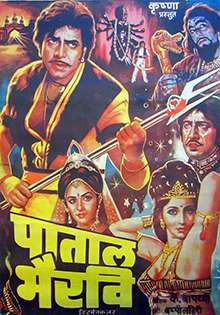Pataal Bhairavi
Pataal Bhairavi (transl. The goddess of the netherworld) is a 1985 Indian Hindi-language swashbuckling fantasy film, produced by G. Hanumantha Rao by Padmalaya Studios, presented by Krishna and directed by K. Bapaiah. It stars Jeetendra, Jaya Prada with music composed by Bappi Lahiri. The film is remake of the Telugu movie Patala Bhairavi (1951), starring N.T.Rama Rao, Malathi, S.V.Ranga Rao.[1]
| Pataal Bhairavi पाताल भैरवी | |
|---|---|
 Movie Poster | |
| Directed by | K. Bapaiah |
| Produced by | G. Hanumantha Rao Krishna (Presents) |
| Written by | Kader Khan (dialogues) Indeevar (lyrics) |
| Story by | P. Nagendra Rao |
| Based on | Patala Bhairavi (1951) |
| Starring | Jeetendra Jaya Prada |
| Music by | Bappi Lahiri |
| Cinematography | V. S. R. Swamy |
| Edited by | K. Gopal Rao |
Production company | |
Release date |
|
Running time | 149 minutes |
| Country | India |
| Language | Hindi |
Plot
Once upon a time, there was a kingdom, Ujjain, ruled by Maharaj Raja Vijay Singh (Pran), his only daughter Princess Indumati (Jayaprada) loves a dynamic guy Ramu (Jeetendra), who works as a gardener in the fort. Knowing it, Maharaj challenges Ramu to amass wealth equal to that of his to marry Indumati. Parallelly, a wizard, Mantrik Husair (Kader Khan) wants to achieve the power of Pataal Bhairavi which is in the form of the statuette and fulfills the wish of the person holding it. To acquire it, a dynamic person is required, Husair selects Ramu and traps him on an assurance that he will aid him in marrying the princess. Actually, his ploy is to sacrifice him before the Goddess to obtain the statuette. After making an adventurous journey, both of them reach there, when Ramu learns Husair's crooked plan, so, he clearly sacrifices him before Goddess and wins the statuette, consequently amassing the wealth. In return, Maharaj lives up to his promise and accepts for the alliance. Meanwhile, Husair's apprentice Sadajapa (Asrani) discovers his master death and brings him back to life. Upon resurrection, Husair steals the statuette and kidnaps Indumati. Ramu pledges to bring Indumati his wealth back and leaves in search of Husair. After crossing many hurdles, Ramu protects Indumati, recovers the statuette, and knocks out Husair. Finally, Ramu marries Indu and returns the statuette to the Goddess as it shouldn't be misused.
Cast
- Jeetendra as Ramu
- Jaya Prada as Princess Indumati
- Pran as Maharaja Vijay Singh
- Amjad Khan as Vishwanath Chanchal
- Kader Khan as Mantrik Husair
- Asrani as Sadajappa
- Shakti Kapoor as Hanuman
- Bindu as Maharani Swarnapati Singh
- Nirupa Roy as Ramu's mother
- Dimple Kapadia as Yaskankya
- Viju Khote as Chanchal's attendant
- Prema Narayan as Nalini (Indumati's Attendant)
- Silk Smitha as Dancer
- Shoma Anand as Goddess Pataal Bhairavi
- Alka Noopur as Goddess
Soundtrack
| # | Title | Singer(s) |
|---|---|---|
| 1 | "Tannana Tannana" | Kishore Kumar, Asha Bhosle |
| 2 | "Jhoom Jhoom Ke Naacho Tum" | Kishore Kumar, Asha Bhosle |
| 3 | "Mehman Nazar Ki Ban Ja" | Kishore Kumar, Lata Mangeshkar |
| 4 | "Ek Bechara Phas Gaya" | K. J. Yesudas |
| 5 | "Pyar Ke Liye" (I) | K. J. Yesudas |
| 6 | "Pyar Ke Liye" (II) | K. J. Yesudas |
| 7 | "Chumma Chumma" | Salma Agha |
| 8 | "Kaalike Kapaalike" | Anup Ghoshal |
| 9 | "Ek Dupatta Do Do Mawaali" | S. Janaki |
References
- Rajadhyaksha, Ashish; Willemen, Paul (1999). Encyclopaedia of Indian cinema. British Film Institute. Retrieved 1 January 2012.